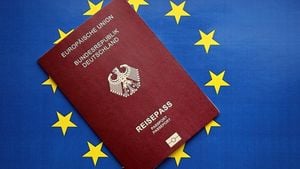The Indian coastline recently became the center of attention following the massive seizure of approximately 700 kg of methamphetamine, one of the most potent synthetic drugs. This significant operation took place off the Gujarat coast on November 15, 2024, involving various law enforcement agencies, including the Narcotics Control Bureau (NCB), Indian Navy, and the Anti-Terrorism Squad (ATS) of Gujarat Police.
According to the NCB, the operation was codenamed "Sagar-Manthan-4" and was initiated based on careful intelligence collection and analysis. Authorities had received credible information indicating the entry of an unregistered vessel loaded with narcotics, which was not equipped with the Automatic Identification System (AIS)—a device used to track maritime vessels.
Indian Navy patrol assets played a pivotal role during the operation, intercepting the suspicious vessel and enabling the seizure of the substantial drug consignment. Alongside this, the authorities apprehended eight foreign nationals, who claimed to be Iranians but, intriguingly, lacked any identifiable documents.
The street value of the seized methamphetamine is estimated to range from Rs 2,500 to Rs 3,500 crore (approximately $300 to $420 million) on the international market. This enormous drug haul emphasizes not only the rising challenge of drug trafficking through maritime routes but also the persistence of international drug cartels.
This operation marks the second major success for the Indian Navy this year concerning anti-narcotics efforts. Earlier, similar operations had led to the seizure of over 3,500 kg of drugs, resulting in the arrest of 11 Iranian and 14 Pakistani individuals involved in three different drug trafficking cases across waters associated with India.
Indian authorities are now delving deep to investigate the drug syndicate's networks. This includes tracing both the backward and forward linkages of these operations. They are also seeking assistance from foreign Drug Law Enforcement Agencies (DLEA) to dismantle the broader drug trafficking cartel.
The Indian government has steadfastly committed to combatting the narcotics trade, particularly emphasizing the vision of establishing a 'Nasha Mukt Bharat' (Drug-Free India) by the year 2047. This ambition was echoed by Union Home Minister Amit Shah, who congratulated the security agencies on their successful operation, commending the cohesion between various agencies.
He tweeted: "Pursuing PM Shri @narendramodi Ji's vision for a drug-free Bharat, our agencies today busted an international drug trafficking cartel and seized over 700 kg of contraband meth." With the government's recent initiatives, such as creating 111 posts within the NCB, including high-profile positions, it’s evident they are reinforcing their fight against drug syndicates.
Despite these successes, the increasing frequency and scale of drug seizures raise alarm bells. The interception of these vessels is indicative of how sophisticated and organized the drug trafficking operations have become. Sources indicate these cartels employ unregistered vessels to evade scrutiny, posing challenges for law enforcement agencies tasked with monitoring vast coastlines.
The need for comprehensive maritime surveillance and intelligence gathering has never been clearer, as authorities continue their relentless pursuit to dismantle these networks. Notably, the Indian Coast Guard has also been enhancing its skills and capabilities to respond to such threats. With the implementation of technology and improved training, authorities aim to stay one step ahead of traffickers who are increasingly using maritime routes to transport illegal substances.
Reflecting upon this concerning trend, strategic coordination among multiple agencies and nations is imperative to counter these threats effectively. The fight against narcotics is not solely about enforcement; it involves comprehensive strategies such as community engagement and education to deter drug abuse and trafficking.
This significant seizure off the Gujarat coast is just one encounter within the ever-evolving battle against drug trafficking. With globalization and the advent of modern technology, drug trafficking is poised to be more significant—and more dangerous—than ever before. The situation calls for continued vigilance, innovation, and collaboration among international partners working toward the common goal of eradicting drugs from the region and beyond.



